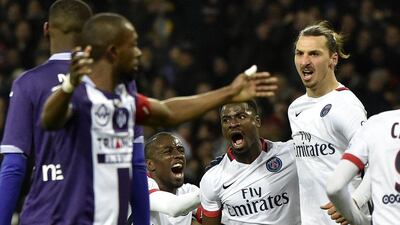Diego Forlan writes a weekly column for The National, appearing in print each Friday. The former Manchester United, Inter Milan and Atletico Madrid striker has been the top scorer in Europe twice and won the Golden Boot at the 2010 World Cup. Forlan’s column is written with the assistance of European football correspondent Andy Mitten.
I have never played for a team which has run away with a league title, leaving everyone else miles behind.
Paris Saint-Germain players and fans may view it differently, but their team being 21 points clear in Ligue 1 after only 21 games is not good for the league.
PSG have great players including my old national team strike partner Edinson Cavani and they are unbeaten, but competition, shocks and excitement are what make football the most popular sport in the world.
If one team dominates and runs away with the league as unbeaten PSG are doing, then people switch off long before the league has finished.
This season, from Europe I’d much rather watch a game from England, Spain or Italy than Germany or France on television.
In Germany, Bayern Munich will win the Bundesliga again. That's fine for Bayern fans, but what about the rest?
Bayern are so powerful that they can buy the best players from the second biggest club, Borussia Dortmund. That makes them even stronger and keeps Dortmund behind.
Bayern are brilliantly run, stable and do many things right, but there are dangers when one club becomes too powerful. It becomes boring.
In Italy, just six points separate the top four teams. Juventus started terribly but are now up to second. Napoli, who haven't won the league since 1990, are top, while Fiorentina, who haven't won the scudetto since 1969, are fourth. That is exciting.
In England, a point separates the top three. In Spain, it’s four points. This is much better.
Diego Simeone's contribution to Spanish football is immense. He has saved the league from accusations of it being dominated by Barcelona and Real Madrid.
They were starting to get more and more points and lose fewer and fewer games, then Simeone's Atletico side clicked, won the league and currently sit top of the Primera Liga.
Atletico were improving when I was there. We went from a club which did not reach the Uefa Champions League or win trophies to one which did.
I played with exceptional young players like Sergio Aguero and David de Gea, but Simeone, who has been a success when he has coached at smaller clubs as well as Atletico, has made them one of the best teams in the world and he has kept them there.
The Primera Liga is right to be worried about the money flooding into the Premier League, especially from next season when the huge new TV contract starts.
They big up the fact that the best players in the world still play in Spain, yet Simeone has done as much for the credibility of the league as any player.
It is wonderful for Spain, for Madrid. The league does not have the even distribution of television money as they should have and the big two still get too much of the share, but it is a country which produces and imports top footballers.
We have seen my old club Villarreal beat both Madrid teams at home this season, Sevilla defeat the big teams at home and Eibar, a tiny, tiny team in a stadium which holds 6,000, now in sixth, a European position.
That is a much better sporting story than PSG getting a rich owner and buying the best players.
In Uruguay, there has been close competition since the opening game of the season right up to the break. The two biggest teams, my own club Penarol and our biggest rivals Nacional, were fighting with Cerro, a smaller club.
It was good for football in Uruguay. We push each other on, the whole country watches, as they will do when the league resumes.
Interest is high and as I do this column I’m preparing for a friendly game against Nacional when 30,000 are expected.
I would not blame people in Germany and France for waiting for the Uefa Champions League to restart.
It is more interesting than their domestic leagues, which are bad for fans and bad for sponsors.
There will be no exciting ends to Ligue 1 and the Bundesliga and the leaders need rivals.
Rivals to push them domestically and raise their levels, rivals to keep interest high. It would be better if Lyon or Marseille, two huge French clubs, could compete with PSG again, though it is hard to compete with such wealth.
England has it right. We saw Manchester United lose to Bournemouth, Stoke City and Norwich City in December.
Those results would have been unimaginable when I was there. It is not good for United fans and I would always rather see United win, but it is great for the league that Leicester City are joint leaders.
I like the system we have in Uruguay, where the league is split into two. It stops one team running away and, by having a break between the two leagues, allows the smaller clubs to recover their squads and get any injured players fit again. It works.
When the league restarts, everyone is equal again. If your team are only a few points behind a rival then you are extra motivated to beat them. You’re not so motivated if you are 25 points behind.
The system used in American sports leads to more equality too, with drafts and money divided centrally.
I am not saying that should be used in football, but when one club is so far ahead of the rest then it is human nature to lose interest and look for something more exciting.
sports@thenational.ae
Follow us on Twitter @NatSportUAE
Like us on Facebook at facebook.com/TheNationalSport

